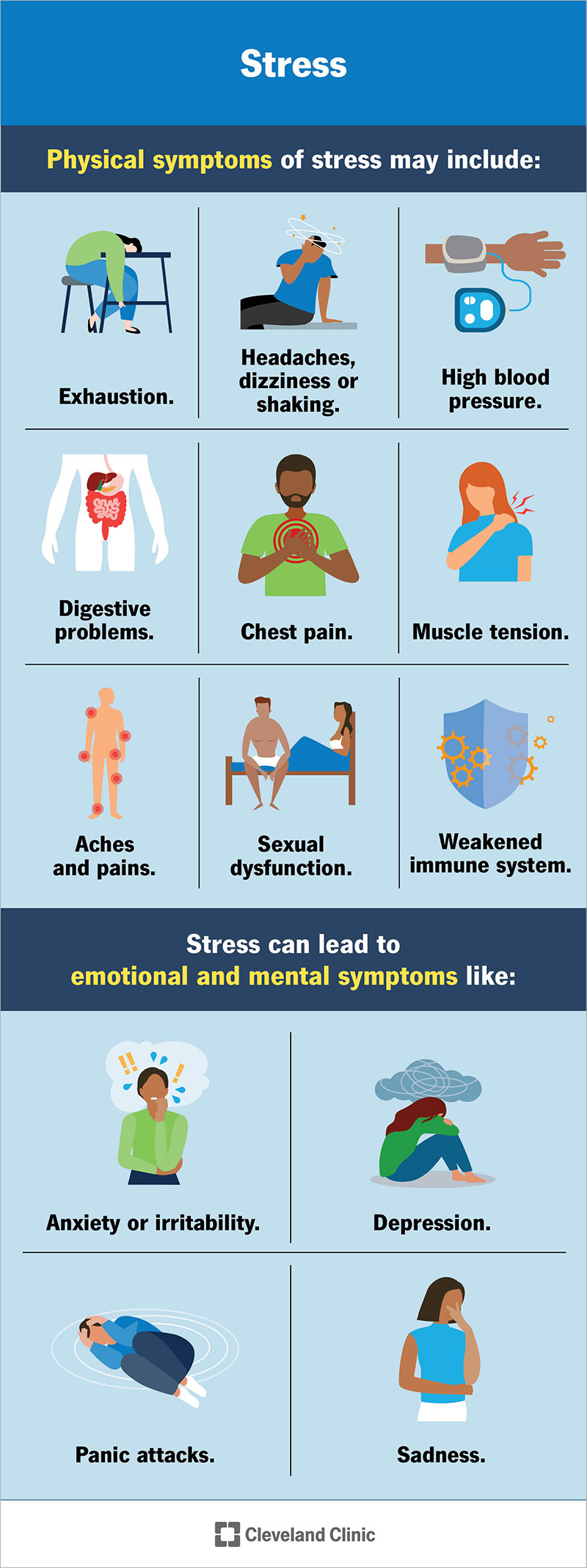Stress is the natural reaction your body has when changes or challenges occur. It can result in many different physical, emotional and behavioral responses. Everyone experiences stress from time to time. You can’t avoid it. But stress management techniques can help you deal with it.
Advertisement
Cleveland Clinic is a non-profit academic medical center. Advertising on our site helps support our mission. We do not endorse non-Cleveland Clinic products or services. Policy
Stress is a natural human reaction that happens to everyone. In fact, your body is designed to experience stress and react to it. When you experience changes or challenges (stressors), your body produces physical and mental responses. That’s stress.
Advertisement
Cleveland Clinic is a non-profit academic medical center. Advertising on our site helps support our mission. We do not endorse non-Cleveland Clinic products or services. Policy
Stress responses help your body adjust to new situations. Stress can be positive — keeping you alert, motivated and ready to avoid danger. For example, if you have an important test coming up, a stress response might help your body work harder and stay awake longer. But stress becomes a problem when stressors continue without relief or periods of relaxation.
There are three main kinds of stress: acute, episodic acute and chronic.
Advertisement

Image content: This image is available to view online.
View image online (https://my.clevelandclinic.org/-/scassets/images/org/health/articles/11874-stress)
Your body’s autonomic nervous system controls your heart rate, breathing, vision changes and more. Its built-in stress response — the “fight-or-flight response” — helps your body face stressful situations.
When you have long-term (chronic) stress, continued activation of the stress response causes wear and tear on your body. You may develop stress symptoms that are physical, psychological or behavioral.
Physical symptoms of stress may include:
Stress can lead to emotional and mental (psychological) symptoms, like:
Often, people with chronic stress try different things to cope. And some of those things are habit-forming and can have an impact on your health. These may include:
Stress rashes often appear as pink or discolored, raised bumps called hives. Hives are welts that can develop and swell on the surface of your skin. They can itch, burn and even hurt. Hives are usually an allergic reaction to something, like certain kinds of foods, fabrics or chemicals. But sometimes, stress can trigger an outbreak.
Stress rashes are more common in females, and they affect people in their 20s, 30s and 40s most often. But they can also affect anyone. Like other kinds of hives, you can try treating them with an antihistamine. But it’s also important to manage your stress.
Stress is how your body reacts to a change or challenge, and many different things can lead to it. Stressors can also be positive or negative. For instance, getting a new job or losing a job can both cause stress. Other causes of stress include:
Stress can also be acute, meaning short term. Causes of acute stress may include everyday stressors, like:
Advertisement
Chronic stress can lead to many long-term health issues affecting your:
Stress can also put you at a higher risk of developing a mental health condition, like depression or anxiety. If you’re feeling severely stressed and/or thinking about hurting yourself, call or text 988 to reach the 988 Suicide & Crisis Lifeline.
Stress is subjective — not measurable with tests. Only the person experiencing it can determine whether it’s present and how severe it feels. A healthcare provider may use questionnaires to understand your stress and how it affects your life.
If you have chronic stress, your healthcare provider can evaluate symptoms that result from stress. For example, they can diagnose and treat high blood pressure.
You can’t avoid stress. But you can stop it from becoming overwhelming by practicing some daily stress relief strategies:
Advertisement
Stress can be a short-term issue or a long-term problem, depending on what changes in your life. Regularly using stress management techniques can help you avoid most physical, emotional and behavioral symptoms of stress.
Many daily strategies can help you keep stress at bay:
You should seek medical attention if:
Advertisement
Your primary care provider can help by offering advice, prescribing medicine or referring you to a mental health professional, like a psychologist or psychiatrist.
If you’re thinking about hurting yourself or you’re in immediate distress, call or text 988 to reach the 988 Suicide & Crisis Lifeline. This service provides 24-hour, confidential support to anyone in the United States experiencing emotional distress or a suicidal crisis.
Questions you may want to ask your provider include:
It’s natural to have stress sometimes. You slept in, your shirt’s wrinkly and you’re going to be late for that job interview — now, you feel stressed. But long-term stress can cause physical, emotional and behavioral symptoms. It’s important to get control over your chronic stress because it can lead to other health issues. If symptoms of stress aren’t going away with stress relief techniques and if you’re feeling overwhelmed, talk to a healthcare provider.

Sign up for our Health Essentials emails for expert guidance on nutrition, fitness, sleep, skin care and more.
Learn more about the Health Library and our editorial process.
Cleveland Clinic’s health articles are based on evidence-backed information and review by medical professionals to ensure accuracy, reliability and up-to-date clinical standards.
Cleveland Clinic’s health articles are based on evidence-backed information and review by medical professionals to ensure accuracy, reliability and up-to-date clinical standards.
Your mental well-being is just as important as your physical well-being. Cleveland Clinic’s mental health experts can help you live life to the fullest.
